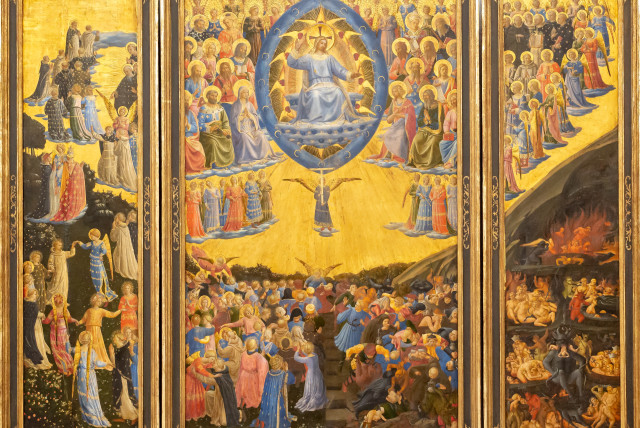Only a Messi-like leader can heal and unite a fractured Israel

Lionel Messi's football prowess led Barcelona and Argentina to numerous victories, paralleling the biblical concept of a Messiah—one that Israel needs as it faces ongoing threats.
Lionel Messi, regarded as one of the greatest soccer players of all time, is often referred to as the “Messiah of football.” His mercurial brilliance during a long career with Barcelona led to his team winning numerous trophies. It was Messi who led and inspired Argentina to glory in winning the 2022 World Cup.
The concept of the Messiah traces its roots to the Bible. The prophets often referred to how a man will emerge from the House of David, imbued by God with wisdom and understanding, who will assume leadership of the Jewish people. Christianity emerged following the crucifixion of Jesus, and he was crowned by his mainly Jewish followers as the Messiah.
The majority of Jews did not accept Jesus as the Messiah. Throughout the centuries, Jews have continued to pray daily for the coming of the Messiah, which will bring about the end of war and an era where all people regardless of race, religion or culture will live in peace.
Jews have just celebrated Passover, which commemorates the redemption of the Jewish people from slavery in Egypt. Every year, the Jews recite the “Haggadah,” which tells the story of how God’s miracles led to freedom. A key passage in the Haggadah states that in every generation, Jews will face enemies who will try to destroy us and that God will save us.
When Israel was established in 1948 following the decimation of six million Jews during the Holocaust, religiously inclined Zionists expressed the belief that we had entered into a period of our history known as the “beginning of the redemption.”
Approaching Israel’s 76th birthday, it is now being confronted by the Iranian axis of evil, which is determined to eradicate the Jewish nation.
Internal divisions throughout Israel's history
Throughout Israel’s existence, there have been major internal divisions between left and right and religious versus secular. However, Israel has always overcome these historical divisions, uniting as a country during periods of adversity.
Over the last decade, Israel experienced its greatest period of prosperity. It also experienced its most unstable period of government. Five elections in four years. Dysfunctional governments formed, composed of coalitions with sectoral interests promoted by minor members to the detriment of the country. The attempt to carry out the judicial reforms was the most recent fiasco.
Then came Oct. 7, and the nation is still dealing with the fallout. The country needs to save the hostages, dismantle Hamas, quell Hizbullah and return its citizens to northern Israel, prevent terror in Judea and Samaria, and confront Iran.
While doing so, the country is in the terrible position of being ruled by a government that is seen as responsible for the current predicament. The responsibility, however, stretches way beyond the Likud party and Prime Minister Bibi Netanyahu. Most parties across the political landscape have, in some manner or form, contributed to the current state of affairs.
Israeli politicians Benny Gantz and Yair Lapid served as ministers in previous government coalitions led by Netanyahu. Lapid and Naftali Bennett each had their own time at the helm. Gantz and Gadi Eizenkot were former heads of the IDF.
At some time in the near future, the current hostilities will end. The country will enter a period of reckoning replete with recriminations, and all those deemed responsible for the events that led towards Oct. 7 will be put out to pasture.
The leaders in the Israeli military and security echelons have already accepted responsibility. To date, Netanyahu has refused to do so. When the country went to war, the silent majority preferred a unity government. Sadly, the longer the war continues, the anger and frustrations that the people harbor will continue to fester, as evidenced by the ongoing demonstrations conducted throughout the country. The cry for new elections is getting louder by the day.
Political pundits have regularly conducted polling as to who will emerge to lead the nation as it recovers from the trauma of Oct. 7. Gantz is the current favorite. Netanyahu, for all intents and purposes, should retire. However, he can never be ruled out. Who else is there? Is there a successor to Netanyahu in the Likud? Will ex-Mossad head Yossi Cohen be anointed as the country’s savior? Will Bennett mount a comeback?
When one listens to street talk, the common refrain one hears is that “they all have to go.” Israel is desperate for new leadership that can inspire and unite its people and lead the country out of its current malaise.
The Messiah cannot come soon enough, but in the meantime, we Jews should pray that a political leader with Messi-like qualities will emerge to unify and rehabilitate the nation.
Jerusalem Post Store
`; document.getElementById("linkPremium").innerHTML = cont; var divWithLink = document.getElementById("premium-link"); if (divWithLink !== null && divWithLink !== 'undefined') { divWithLink.style.border = "solid 1px #cb0f3e"; divWithLink.style.textAlign = "center"; divWithLink.style.marginBottom = "15px"; divWithLink.style.marginTop = "15px"; divWithLink.style.width = "100%"; divWithLink.style.backgroundColor = "#122952"; divWithLink.style.color = "#ffffff"; divWithLink.style.lineHeight = "1.5"; } } (function (v, i) { });

